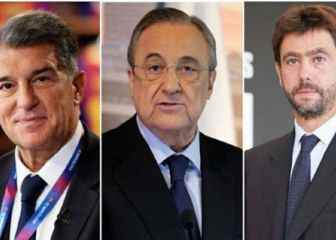“We are one of the 12 founding clubs of the Super League.” With this announcement from Arsenal, as with those of eleven other powerful teams in Europe, a storm was unleashed in the early hours of April 18-19 last year that still endures. It was the órdago of the European elite to UEFA, which they accused of monopoly in the organization of tournaments and from which they wanted to get out. A year has passed since then, a year of permanent turbulence.
The breakaway teams were Real Madrid, Barcelona, Atlético, Juventus, Milan, Inter, Manchester United, Manchester City, Chelsea, Arsenal, Tottenham and Liverpool. Florentino Pérez was announced president of the company and Andrea Agnelli and Joel Glazer, vice-presidents. The hours after the announcement of the Super League are football history.
UEFA, first, and FIFA, later -and more lukewarm-, issued statements against it. Public opinion also began to be against it, among other things because a closed project was announced in which there would only be two open places among the 20 participants. The rest would always go to the founders. The economic wealth, backed by JP Morgan, was unquestionable, but it contrasted with the romantic element that sporting merits disappeared as a classification criterion.
Clubs like PSG and Bayern stayed on the sidelines, which also opened a small crack. However, what fractured the plan the most was the change of direction of the English clubs. Faced with popular pressure from their fans, many of them demonstrating at the gates of the stadiums, and the rejection of Boris Johnson, British Prime Minister, they ended up backing down.
In the hands of the Courts
In the three days following the announcement there were public resignations -although not effective- by the founders except for Madrid, Barça and Juve, who have remained the last survivors. The ECA (Association of European Clubs) expelled them from its fold and put Al Khelaïfi (PSG) as president instead of Agnelli.
UEFA, for its part, opened disciplinary proceedings and the matter ended up in court. The order of the mercantile court number 17 of Madrid paralyzed the possible sanction. The matter was transferred to the European Court of Luxembourg, which must decide whether there is a monopoly or not.
While the judgment of the curia arrives, the society that supports the Super League continues to remove the land. The change of strategy opens new hopes. The new format would no longer be as closed as before, but open to anyone. In addition, only Inter would definitely be out, since a clause like that allowed them to do so. The rest remain in the project legally, despite their advertisements to the contrary.
UEFA is also confident of winning the lawsuit, at the same time that it projects the modification of the Champions League format as if nothing happened. A conflict of interest that was triggered exactly a year ago and that is currently being settled in court. The entrails of football being challenged by the most powerful clubs. Who will win?
